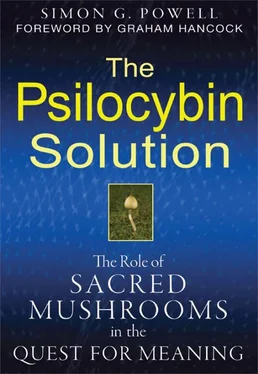As it happened, Koestler’s first encounter with psilocybin occurred at the psychology department of the University of Michigan, which, unfortunately, was another hotbed for covert CIA experimentation and therefore not the best of places in which to start one’s entheogenic journeying. His second taste occurred at Leary’s apartment, as Leary had originally intended. Both encounters convinced Koestler that psilocybin was basically worthless, an opinion dramatically at odds with Leary and most others who had tried it.
On March 12, 1961, the British newspaper the Sunday Telegraph published a polemic article by Koestler in which he denounced the psilocybin experience. Entitled “Return Trip to Nirvana,” this account described Koestler’s personal psychedelic experiences and concluded in no uncertain terms that psilocybin had nothing whatsoever to offer humanity. He wrote: “Chemically induced hallucinations, delusions and raptures may be frightening or wonderfully gratifying; in either case they are in the nature of confidence tricks played on one’s own nervous system.” {16} 16 7. Koestler, Drinkers of Infinity, 209.
He offered even harsher words about his second trip at Leary’s apartment. When an American writer and acquaintance talked of “cosmic awareness,” “expanding consciousness,” and “Zen Enlightenment,” Koestler thought this “downright obscene, more so than four-lettered words.” {17} 17 8. Ibid., 211.
Clearly, here was a man a trifle irritated by the blossoming psychedelic culture. Koestler was no hip hippie.
Koestler went on to argue that psilocybin gave rise to “pressurecooker mysticism” and no more. Discussing Huxley’s pro-psychedelic observation that many mystics and religious visionaries employed various physiology-changing techniques like breathing exercises and fasting to facilitate altered states of awareness, Koestler countered with a parable about mountain climbing, claiming that the view obtained when one has slogged for hours on foot up the mountain is far superior to the view obtained at the end of a cable-car journey. In other words, the laborious toil undertaken by the fasting, self-flagellating, cave-dwelling ascetic leads to a qualitatively different revelation than the armchair mystic who merely pops down a handful of Sandoz pills.
This is the classic philosophical objection laid against the potential transcendental effects of substances like psilocybin. It is too easy. Where is the relentless sweat and toil? Where are the physical scars of the tortuous journey that preceded the mystical illumination? How can one possibly have access to realms of spiritual ecstasy without undergoing years of suffering? Are we to admit that any Tom, Dick, or Leary can achieve transcendence without experiencing untold pain, misery, and self-mortification?
Koestler, at least, was convinced that there were no shortcuts to the divine, and he stated this clearly to Leary and in the newspaper article. Significantly, he admitted to Leary that he was in the wrong state of mind when he tried psilocybin at Leary’s apartment, that he had been awoken to painful memories of being a political prisoner during the war. Similarly, on the night before his first unpleasant brush with the drug, he’d had disturbing dreams that lingered on long enough to pervade the psychedelic state. In fact, Leary himself had second thoughts in inviting Koestler to try psilocybin, as he came across as being too controlled and rational. Although these considerations go a long way in explaining Koestler’s negative encounters, the criticisms he raised still stand strong, and the advocate for the continued investigation of psilocybin must perforce respond to the allegations.
I can offer two lines of defence to parry Koestler’s objections. First, it is almost certain that Koestler did not dwell upon the fact that psilocybin is a natural part of the environment and not an unnatural synthetic product. Had he actually gone out and picked psilocybin mushrooms for himself perhaps his experiences might have been more rewarding, because the actual act of mushroom collection leaves an indelible earthly mark upon the memory. This fact of psilocybin’s naturalness, which I consistently remark on, deserves a still more detailed examination, and this is a good opportunity to begin doing so. I will return to answering Koestler’s criticisms after this brief diversion.
As we shall see in much more detail later, psilocybin is believed to cause its effects by acting upon nerve cells, or neurons, within the brain. In particular, it acts on those neurons that utilize a substance called serotonin. Serotonin is a chemical messenger, or neurotransmitter, that allows individual neurons to communicate with one another to transmit and process information. Now, the various compounds employed by brains to process information have evolved over millions of years, and they are determined by the chemicals available in the environment, in particular, from the raw materials available in food. Serotonin has emerged as a key neurotransmitter, or chemical messenger, because it can be produced relatively simply from raw materials. You cannot just have any old chemical compound acting as a neurotransmitter; it has to have arisen through evolution under the deterministic constraints set by the laws of chemistry and the further constraints set by the availability of food.
Hence, serotonin is bound up with the chemistry of the environment. If the chemical constituency of the natural environment was radically different, Nature would have been forced to evolve completely different neurotransmitters that reflect to the constraints set by that environment. In this sense, we are indeed what we eat, and the notion that consensus reality is a popular serotonergic hallucination yields a formidably uncanny wisdom. Our minds, our very consciousnesses, depend upon the hardware of the brain, which in turn depends on chemical structure, which further depends on diet. Natural psilocybin mushrooms can enter one’s diet, and the new chemicals subsequently operating within the brain will alter awareness so that our common hardwired “serotonergic reality” shifts, as it were, to a rare “mushroomwired psilocybinetic reality.”
Having said this much it should now be absolutely clear that the psilocybin mushroom experience is wholly natural, and that it arises out of an environmentally driven alteration in brain chemistry in as much as the psilocybin mushroom is part of the environment. There is nothing artificial about this process at all. Just as we can selectively pick wheat to make bread for our physical well-being, so too can we selectively pick and consume natural psilocybin mushrooms for our spiritual well-being. Both wheat and mushroom are legitimate natural expressions of the interwoven biospherical system within which we are embedded. I think it unlikely that Koestler considered these environmental facts before making his negative judgments.
The second line of defence against Koestler’s classic objections is that it is not certain that technological short-cuts—as he called them—are necessarily bad. Is not the Earth viewed from space satellites beautiful? Viewed thus, is it really any less beautiful than if we were to build a really large ladder and clamber up to get the same view? Should we abandon all labor-saving technology and make things as hard as possible for humanity?
I think not. Huxley’s vision in The Doors of Perception of a mass-marketed psychedelic that enlightens the world cannot be faulted on its technological methodology. If technology, pharmaceutical or otherwise, can hasten some form of improved psychological condition, then the only thing stopping this is a sense of distrust and guilt, arguably instilled more often than not by dogmatic religion. Indeed, Leary surmised that Koestler’s mountaintop parable arose from a deep-seated Catholic guilt, a guilt that arises all too easily in the face of pleasure, ecstasy, and the bounds of human freedom.
Читать дальше










